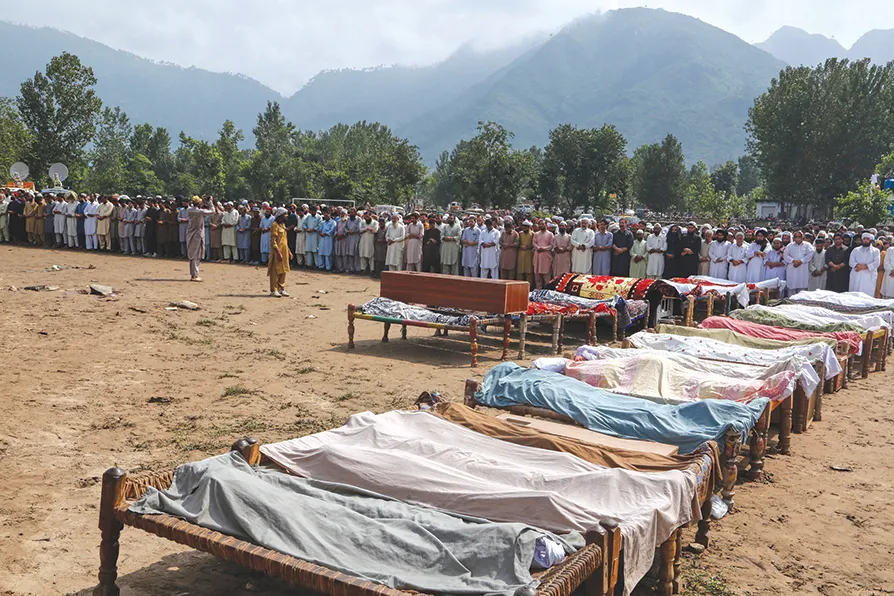This weekend, the NEU holds a special conference to debate changing its approach to organising teaching assistants, which a 2017 TUC agreement forbids. General secretary DANIEL KEBEDE outlines the choices before delegates
The ongoing floods in Pakistan could have been largely prevented, writes ABDUL RAHMAN

 PREVENTABLE TRAGEDY: Funeral prayers for the victims of last Friday's flash flooding, at a village near Pir Baba, Buner district, in Pakistan's northwest, August 16 2025
PREVENTABLE TRAGEDY: Funeral prayers for the victims of last Friday's flash flooding, at a village near Pir Baba, Buner district, in Pakistan's northwest, August 16 2025
PAKISTAN is yet again facing heavy casualties and massive destruction due to unusual heavy rains and floods across the country this year. According to the country’s National Disaster Management Authority (NDMA), more than 650 people have been killed and over 900 others have been injured in rain-related incidents across the country since June 26.
The flash floods in mostly the north-eastern parts of the country have also displaced hundreds of thousands with scores still reported missing.
It is estimated that Pakistan has already received 50 per cent more rain this year in comparison to last year. The country’s meteorological department has warned that the current spell of heavy rains is expected to last until August 19 with three more spells of heavy rains through September after that.
The upcoming spells may cause massive flooding in the areas along the Indus river in the coming days, Pakistani authorities have warned.
Though death and destruction from the floods have been recorded across all the provinces of Pakistan, including the capital Islamabad, the north-eastern Khyber Pukhtunkhwa (KP), and Gilgit-Baltistan have been hit the hardest.
Last week, huge flash floods washed away villages and communication networks at various places in the hilly region of KP and Gilgit-Baltistan. Heavy rains and cloud bursts have destroyed roads, railway lines, schools, hospitals, and other essential civilian infrastructure in KP, Gilgit-Baltistan, and other parts of Pakistan.
Buner in KP, which witnessed a cloud burst last week, has been the hardest-hit district, amassing more than half of all deaths recorded in the province with scores of people still missing.
According to the NDMA, KP recorded the highest number of people killed at 390, followed by Punjab, Pakistan’s largest province, which has recorded 164 deaths. Even the drier regions such as Balochistan have recorded over a dozen deaths due to the heavy rain and flash flooding.
Fresh heavy rains on Monday have made the relief and rescue operations difficult, particularly in the most affected regions in the hills.
Residents in Pakistan’s hilly areas who lost their houses in the flash floods say there were no early warnings of the heavy rains which multiplied the loss of lives and property.
Inam Haider Malik, head of the NDMA, claimed in a press conference in Islamabad on Sunday that it is difficult to predict cloud bursts and flash floods and warned that at least three more spells of heavy rain in the coming days may cause flooding in the lower areas in Pakistan. He emphasised that the “scale of loss is part of the climate change impacts.”
Pakistan’s chief meteorologist Zaheer Babar also claimed that the unusually heavy rains are a result of climate change. However, he also underlined that the impact of erratic rain is multiplied due to haphazard construction near the river valleys and unscientific disposal of waste in the river beds, Geo TV quoted Babar saying.
“The situation in Khyber Pukhtunkhwa and Gilgit Baltistan is devastating. We are in the midst of a climate emergency,” claimed Ammar Ali Jan, leader of the Haqooq-e-Khalq Party (HKP). In his posts on X, Ammar also demanded “Pakistan should receive climate reparations, including debt relief” as it is a victim of “fossil-fuel driven model of Western development.”
Taimur Rahman, leader of the Mazdoor Kisan Party (MKP), underlined the failure of the Pakistani state to treat all its citizens equally, resulting in disproportionate losses to the poor during such floods.
Taimur claimed that the government in the country uses most of its resources on developing flood preventive mechanisms around richer localities while ignoring the needs of the majority of people.
Pakistan has faced repeated floods in the last few years with an increase in the overall rainfall during the monsoon season in particular.
In 2022, in a similar situation, floods killed over 1,700 across Pakistan and affected over 33 million people, badly impacting the peoples livelihoods and the overall economy of the country as it tried to recover from the effects of COVID-19. The floods also destroyed crops, intensifying the overall food insecurity in the country.
This article is republished from peoplesdispatch.org.

JOE ATTARD explains why trade unionists are rallying in solidarity against the recent arrest of political activists in Gilgit-Baltistan, the northernmost region of Kashmir, administered by Pakistan













